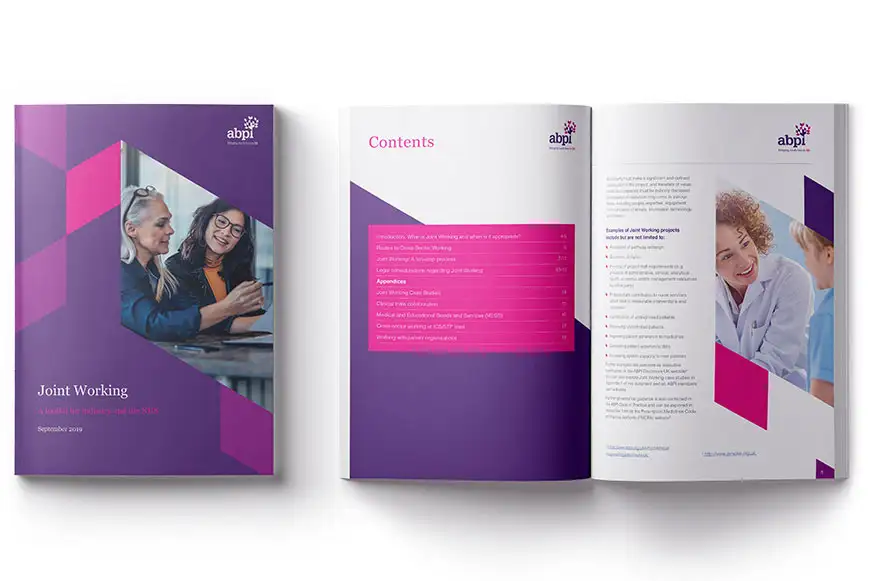Joint Working - a toolkit for industry and the NHS
New guidance to help the NHS and the pharmaceutical industry work successfully together.
What is Joint Working and when is it appropriate?
Joint Working is a specific type of NHS/pharmaceutical industry collaboration rather than a generic term for all cross-sector collaboration. The Department of Health and Social Care defines Joint Working as “Situations where, for the benefit of patients, one or more pharmaceutical companies, the NHS and others (e.g. Patient Groups) pool skills, experience and/or resources for the joint development and implementation of patient-centred projects and share a commitment to successful delivery”. A guide to choosing the most appropriate model for cross-sector working can be found on Page 6.

Joint working
Joint Working projects aim to deliver ‘triple wins’ in the form of benefits to patients, the NHS and the pharmaceutical company or companies involved.
Joint Working projects aim to deliver ‘triple wins’ in the form of benefits to patients, the NHS and the pharmaceutical company or companies involved. Anticipated benefits must be set out clearly in advance. Both the NHS organisation and the company involved may consider quantifying anticipated benefits as projected returns on investment (ROI) before committing to a Joint Working project.
Potential benefits of Joint Working include:
For patients:
- Care closer to home
- Fewer hospital admissions
- Better information about conditions and treatment options
- Better experience of the healthcare system
For the NHS:
- Higher quality care
- Services configured around patient needs Better health outcomes
- Better use of resources
- Lower hospital admissions
For the industry partner:
- Potential expansion of the relevant and eligible patient population as a result of the activity
- Increase in the appropriate use of medicines aligned to local or national guidance
- Better understanding of the challenges faced by the NHS in delivering high-quality patient services and care
- Faster implementation of NHS policy which may be relevant to a company’s business
All Joint Working projects must be underpinned by a formal Joint Working Agreement1, an executive summary of which must be made publicly available before the project begins. Agreements must take place at a corporate/organisational level and not with individual health professionals. Agreements must include an exit strategy, contingency arrangements, clear milestones and a commitment to measure, sustain and document outcomes to facilitate replication and scaling across the NHS.
Each party must make a significant and defined contribution to the project, and transfers of value made by companies must be publicly disclosed. Contribution of resources may come in various forms, including people, expertise, equipment, communication channels, information technology and finance.
Examples of Joint Working projects include but are not limited to:
- Facilitation of pathway redesign
- Economic analysis
- Funding of project staff requirements (e.g. provision of administrative, clinical, analytical health, economic and/or management resources by either party)
- Proportionate contribution to nurse services which lead to measurable interventions and outcomes
- Identification of undiagnosed patients
- Reviewing uncontrolled patients
- Improving patient adherence to medicines
- Generating patient experience data
- Increasing system capacity to treat patients
Further examples are available as executive summaries on the ABPI Disclosure UK website2. You can also explore Joint Working case studies in Appendix 1 of this document and on ABPI members’ own websites.
Further governance guidance is also contained in the ABPI Code of Practice and can be explored in interactive form on the Prescription Medicines Code of Practice Authority (PMCPA) website3.
Related content in this section:
- Joint Working - a toolkit for industry and the NHS
- Routes to Cross-Sector Working
- Joint Working: A ten-step process
- Legal considerations: regarding Joint Working
- Appendix 1: Joint Working Case Studies
- Appendix 2: Clinical trials collaboration
- Appendix 3: Medical and Educational Goods and Services (MEGS)
- Appendix 4: Cross-sector working at ICS/STP level
- Appendix 5: Working with patient organisations